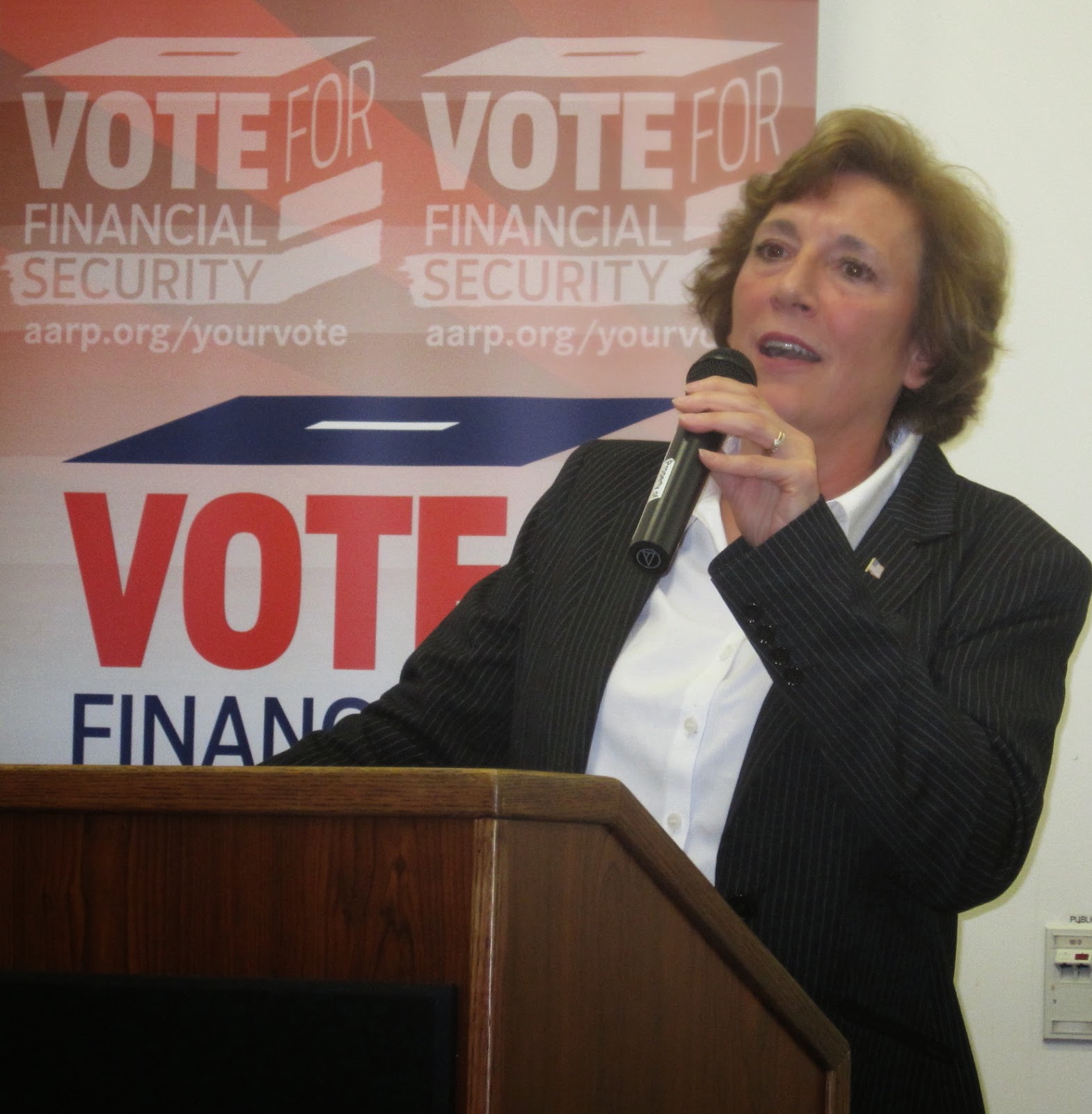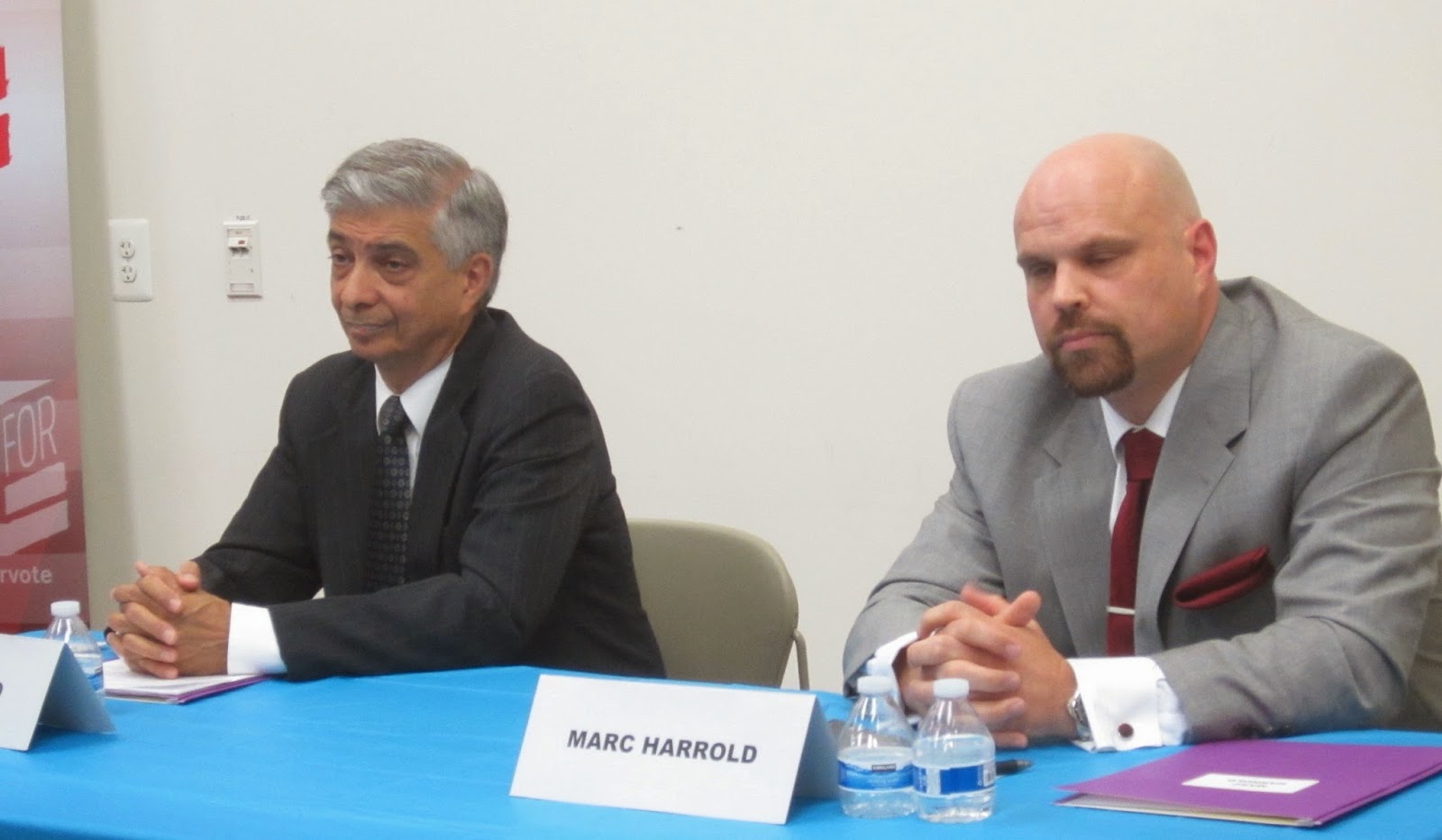Congressional candidates share views on economy, guns, and climate change
 |
| Suzanne Scholte |
Residents of the 11th congressional district packed a meeting room at the Fairfax Regional Library Sept. 10 to hear from the three candidates challenging Rep. Gerry Connolly (D) in the November election.
The participants were Republican Suzanne Scholte, Green Party candidate Joe Galdo, and Libertarian Marc Harrold. The session was hosted by the League of Women Voters of the Fairfax Area, AARP Virginia, the Providence District Council, and the Coalition of Asian Pacific Americans of Virginia.
Connolly himself wasn’t able to be there, as he was attending President Obama’s speech on ISIS. Del. Mark Keam gave a brief statement about Connolly, citing his work on behalf of “bread and butter issues,” such as efforts to improve the nation’s technology infrastructure, his leadership on human rights issues, including sanctions on North Korea, and his ability to “work with his Republican colleagues to get things done.”
If elected, Scholte said her priorities in Congress would be dismantling the Affordable Care Act, which she called a “disaster,” and reducing taxes, which are “strangling businesses.” Scholte is president of the Defense Forum Foundation and a human rights activist focusing on North Korea.
Galdo, a retired federal employee, whose last job was at the Energy Department, said he’s running as a Green Party candidate because he likes their values: grassroots democracy, social justice, and protecting the environment.
Harrold, an immigration attorney, said his campaign theme is “liberty, simplicity, and transparency.” He supports a more limited role for government.
 |
| Joe Galdo (left) and Marc Harrold |
When asked about climate change, Harrold warned against science becoming too intertwined with policy and said he’s more worried about the Environmental Protection Agency becoming an “enforcer” of environmental regulations.
Scholte said she has “no regrets” about global warming, and said the biggest problem is China, India, and other countries – not the United States.
“We can do a lot better in energy efficiency,” Galdo said, calling for the nation to set more aggressive goals and stop shipping coal and oil to China. We also need to “prepare for the worst,” he warned, as the melting of ice in Antarctica is irreversible.
Regarding defense, Harrold called for a drastic reduction in military spending, saying, “we need to stop playing the role of the world’s policeman.” Instead, we should “limit the Defense Department to defense.”
Scholte took a more activist role, saying, “we have to have a strong defense” and “be a leader for freedom, democracy, and human rights.” Noting that if America doesn’t lead, other nations will step in, she said, “I’m very concerned we’re seeing freedom rolled back all over the world.”
Galdo said the nation should deal with international conflicts through diplomatic means rather than military action and called for “a focus on outcomes, not emotional responses.”
When asked if they would support universal background checks for people trying to purchase firearms, both Scholte and Galdo said “yes.”
Harrold said, “not necessarily. Bearing arms is an individual right.” Any regulation on guns could lead to “a national registry of firearms,” he warned. He called background checks a “slippery slope,” that could lead to someone being refused the right to buy a gun simply because they’re depressed. “We don’t have a problem with guns. We have a mental health crisis.”
“Gun control won’t solve all the problems, but it will help,” Galdo countered. “We need to close the loopholes.” He also called for more support for people with mental illnesses, adding, “Abandon the drug war and treat it as a health issue.”
Noting that her son has a bipolar diagnosis, Scholte said, “we need to do more to de-stigmatize mental health.”
Harrold said mental health should not be a federal issue. Except for serving veterans, he said mental health programs should be run by states.
Galdo said his top priorities on the economy are tax reform, with the goal of paying down the national debt and slowing down inflation. He would also bring jobs back from oversees, “stop promoting consumerism and credit,” and shift the tax burden from the average American to corporations.
Harrold would simplify the tax code because “small business owners are spending most of February and March doing their taxes” rather than concentrating on their businesses. He would also cut the capital gains tax and roll back federal regulations imposed by such agencies as the Environmental Protection Agency and Food and Drug Administration.
Scholte’s solution to improving the economy is dealing with the Affordable Care Act because the “burden of regulation is outrageous” and is “strangling businesses.” As an alternative, she would give people tax incentives for getting their own health insurance.
Scholte would also cut corporate taxes and reduce the tax burden for the middle class. She supports a balanced budget amendment and entitlement reforms, such as raising the retirement age for people entering the federal workforce.
The League of Women Voters and other organizations have scheduled several more candidate forums for the eighth, 10th, and 11th congressional districts over the next few weeks.


Pitiful knowledge of issues….
I wouldn't recognize any of them as candidates for federal office unless you told me.
Sad reflection on our society.
What kind of experience do they have in representing our interest in Federal Government? They all look to be those people who just decided one day why not me!?
We always need qualified challengers to incumbent. This creates check and balances existing system. But they just don't seem to win my vote.
Suzanne Scholte is the most experienced challenger you will ever find. She has worked with both Houses and both parties on Capitol Hill for years. She has been acknowledged in international circles as a leader on human rights, and she knows the people in her district.
Did they not discuss cannabis law reform? They certainly should have!